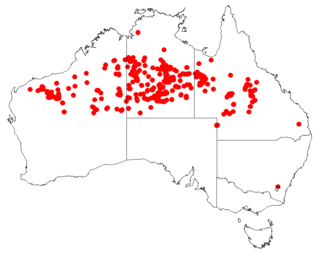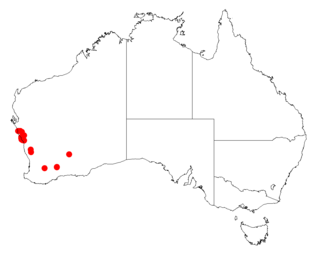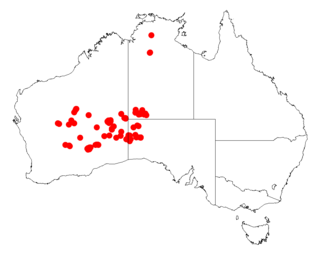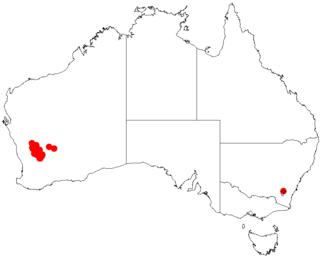
Acacia adsurgens is a shrub belonging to the genus Acacia and the subgenus Juliflorae. It is native to the northern areas of Australia.

Acacia desertorum is a shrub belonging to the genus Acacia and the subgenus Juliflorae that is endemic to western Australia.

Acacia jibberdingensis, also known as Jibberding wattle or willow-leafed wattle, is a shrub or tree belonging to the genus Acacia and the subgenus Juliflorae that is endemic to Western Australia.
Acacia sulcaticaulis, also commonly known as the Mount Mulgine fluted wattle, is a shrub or tree belonging to the genus Acacia and the subgenus Juliflorae that is native to a small area in western Australia.

Acacia websteri is a shrub or tree belonging to the genus Acacia and the subgenus Juliflorae that is endemic to western Australia.

Acacia ferocior is a shrub belonging to the genus Acacia and the subgenus Phyllodineae that is endemic to an area along the south coast of Western Australia.

Acacia intricata is a shrub belonging to the genus Acacia and the subgenus Phyllodineae that is endemic to south western Australia.

Acacia merrallii, commonly known as Merrall's wattle, is a shrub belonging to the genus Acacia and the subgenus Phyllodineae that is endemic to south western and southern Australia.

Acacia oxyclada is a shrub belonging to the genus Acacia and the subgenus Phyllodineae that is endemic to western Australia.

Acacia sphacelata is a shrub of the genus Acacia and the subgenus Phyllodineae that is endemic to south western Australia.

Acacia spinosissima is a shrub of the genus Acacia and the subgenus Phyllodineae native to south western Australia.

Acacia abrupta is a shrub of the genus Acacia and the subgenus Plurinerves that is endemic to arid parts of central and western Australia.
Acacia acellerata is a shrub of the genus Acacia and the subgenus Plurinerves. It is native to an area in the Great Southern region of Western Australia.

Acacia anfractuosa is a shrub or tree of the genus Acacia and the subgenus Plurinerves that is endemic to Western Australia.

Acacia dissona is a shrub of the genus Acacia and the subgenus Plurinerves that is endemic to an area of south western Australia.

Acacia helmsiana, commonly known as Helm's wattle, is a shrub of the genus Acacia and the subgenus Plurinerves that is endemic to arid areas of central and western Australia.

Acacia obtecta is a shrub of the genus Acacia and the subgenus Plurinerves that is endemic to a small area in south western Australia.
Acacia papulosa is a shrub of the genus Acacia and the subgenus Plurinerves that is endemic to a small area along the south coast of south western Australia.

Acacia gracilifolia, commonly known as graceful wattle, is a shrub belonging to the genus Acacia and the subgenus Plurinerves native to a small area of central southern Australia.

Acacia kybeanensis, commonly known as kybean wattle or kybeyan wattle, is a shrub of the genus Acacia and the subgenus Phyllodineae that is endemic to south eastern Australia.

















